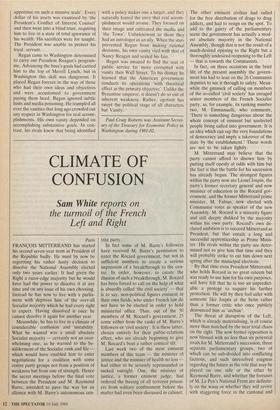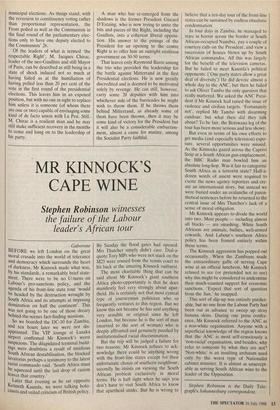CLIMATE OF CONFUSION
the turmoil of the French Left and Right
Paris FRANcOIS MITTERRAND has started his second seven-year term as President of the Republic badly. He must by now be regretting his rather hasty decision to dissolve the National Assembly elected only two years earlier. It had given the Right a razor-edge majority but he would have had the power to dissolve it at any time and on any issue of his own choosing. Instead he has now to live with a parlia- ment with deprives him of the over-all Socialist majority which he had every right to expect. Having dissolved it once he cannot dissolve it again for another year.
Meanwhile, he has to live in a climate of considerable confusion and instability. What he wanted was a small absolute Socialist majority — certainly not an over- whelming one, as he warned to the be- wilderment of the Socialist rank and file which would have enabled him to enter negotiations for a coalition with some centre party groups not from a position of weakness but from one of strength. Hence the secret meetings before the final vote between the President and M. Raymond Barre, intended to pave the way for an alliance with M. Barre's autonomous cen-
trist party.
In fact some of M. Barre's followers have received M. Bane's permission to enter the Rocard government, but not in sufficient numbers to create a serious impression of a breakthrough to the cen- tre. In order, however, to create the illusion of such a breakthrough, M. Rocard has been forced to call on the help of what is absurdly called `the civil society' — that is to say, non-political figures eminent in their own fields, who under French law do not have to be elected in order to hold ministerial office. Thus, out of the 50 members of M. Rocard's government, 25 come either from the ranks of M. Barre's followers or `civil society'. It is these latter, chosen entirely for their public-relations effect, who are already beginning to give M. Rocard's boat a rather comical tilt.
Last week two of the most eminent members of this team — the minister of justice and the minister of health no less had either to be severely reprimanded or sacked outright. One, the minister of justice, ' a former eminent judge, had ordered the freeing of all terrorist prison- ers from solitary confinement before the matter had even been discussed in cabinet. The other eminent civilian had called for the free distribution of drugs to drug addicts, and had to resign on the spot. To add to the gaiety of the parliamentary scene the government has actually a mod- est absolute majority in the National Assembly, though that is not the result of a much-desired opening to the Right but a thoroughly undesired reopening to the Left — that is towards the Communists.
In fact, on three occasions in the brief life of the present assembly the govern- ment has had to lean on the 26 Communist deputies to see it through to safety. Mean- while the gimmick of calling on members of the so-called `civil society' has enraged senior members of the French Socialist party, as, for example, its ranking number two, M. Emmanuelli, who comments, `There is something dangerous about the whole concept of eminent but unelected people being called into government. It is an idea which can sap the very foundations of democracy and imply a takeover of the state by the establishment.' These words are not to be taken lightly.
M. Mitterrand may believe that the party cannot afford to disown him by putting itself openly at odds with him but the fact is that the battle for his succession has already begun. The strongest figures within the party now are Lionel Jospin, the party's former secretary general and now minister of education in the Rocard gov- ernment, and the former Mitterrand prime minister, M. Fabius, now elected with Communist votes as speaker of the new Assembly. M. Rocard is a minority figure and still deeply disliked by the majority within his own party. Rocard's own de- clared ambition is to succeed Mitterrand as President, but that entails a long and successful apprenticeship as Prime Minis- ter. His rivals within the party are deter- mined not to give him that time and they will probably strike to cut him down next spring after the municipal elections.
By that time even President Mitterrand, who holds Rocard in no great esteem but was ready to use him for his own purposes, will have felt that he is too an unpredict- able a protege to require his further protection. He will by then feel safer with someone like Jospin at the helm rather than a former critic who once publicly denounced him as `archaic'.
The threat of disruption of the Left, which is already materialising, is of course more than matched by the near total chaos on the right. The now formal opposition is now blessed with no less than six potential rivals for M. Mitterrand's succession, three separate parliamentary groups, two of which can be sub-divided into conflicting factions, and such unresolved enigmas regarding the future as the role that.may be played on one side or the other by Raymond Barre, and whether the fortunes of M. Le Pen's National Front are definite- ly on the wane or whether they will revive with staggering force in the cantonal and municipal elections. As things stand, with the reversion to constituency voting rather than proportional representation, the Front polled as well as the Communists in the final round of the parliamentary elec- tions only to have one deputy elected to the Communists' 26.
Of the leaders of what is termed 'the respectable Right', M. Jacques Chirac, leader of the neo-Gaullists and still Mayor of Paris, can be described as still being in a state of shock induced not so much at having failed as at the humiliation of having polled less than 20 per cent of the vote in the first round of the presidential elections. This leaves him in an exposed position, but with no one in sight to replace him unless it is someone (of whom there are one or two) capable of envisaging some kind of de facto union with Le Pen. Still, M. Chirac is a resilient man and he may still make sufficient recovery in the months to come and hang on to the leadership of his party. A man who has re-emerged from the shadows is the former President Giscard D'Estaing, who is now trying to unite the bits and pieces of the Right, including the Gaullists, into a coherent liberal opposi- tion. His answer to the pinings of the President for an opening to the centre Right is to offer him an outright coalition government on 50-50 terms.
That leaves only Raymond Barre among the trio who provided the leadership for the battle against Mitterrand in the first Presidential elections. He is now greatly discredited and is deemed to be motivated solely by revenge. He can still, however, carry some 20 deputies with him into whichever side of the barricades he might wish to throw them. If he throws them behind Mitterrand, as already some of them have been thrown, then it may be some kind of victory for the President but it will also be a considerable embarrass- ment, almost a cause for mutiny, among the Socialist Party faithful.



















































 Previous page
Previous page